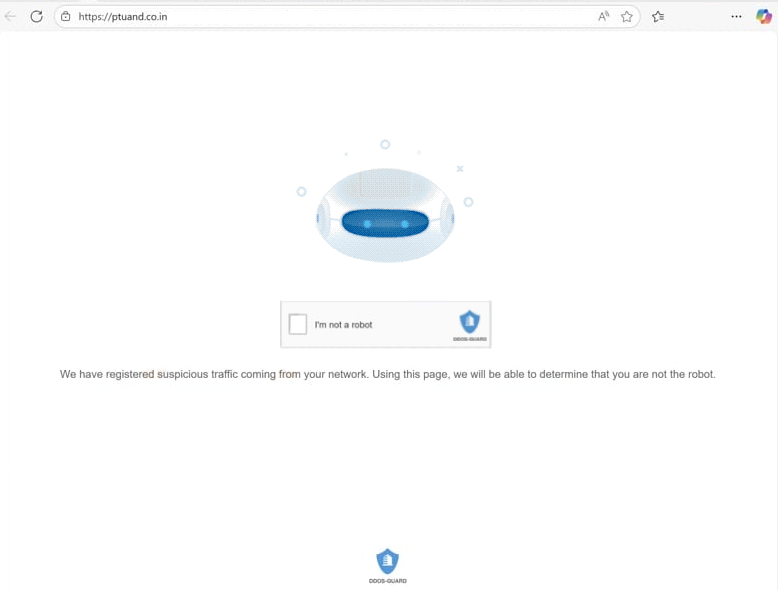Remove ptuand.co.in pop-up ads
ptuand.co.in is a scam website, solely created to trick users into enabling desktop ads. If you get redirected to it, you’ll see a browser alert saying “ptuand.co.in wants to show notifications”. If you click “Allow”, the site will misuse a legitimate feature to send potentially dangerous ads directly to your desktop. The site misuses a legitimate browser feature, but instead of showing useful or interesting content, the site shows ads. These ads may expose you to malicious content like malware and scams. If you’ve accidentally or purposely granted permission, it’s important to revoke it immediately. The process is simple, and instructions will be included at the end of this report.
The “show notifications” feature is legitimate, but not all sites should be given permission. Certain websites, such as ptuand.co.in, exploit it to bombard users with advertisements. When you get redirected to ptuand.co.in, a browser prompt will appear saying “ptuand.co.in wants to show notifications”. The site is completely empty, but it’s made to appear as if clicking “Allow” will give you access to the site’s content. Granting ptuand.co.in permissions will result in desktop advertisements, which could expose you to scams or malware. What’s more, these ads can mimic authentic system alerts, making it difficult to distinguish them from legitimate notifications. It is strongly recommended to immediately revoke notification permissions for such sites if you have given them.
To identify the source of unwanted redirects to websites like ptuand.co.in, it is advisable to use the WiperSoft antivirus program to scan your system. If adware is detected, its removal will put an end to these redirects. Regardless of whether adware is detected or not, installing an ad blocker is also recommended to prevent pop-ups and redirects.
Random redirects can be a sign of adware
If you get redirected to ptuand.co.in on a regular basis, even when on safe sites, adware could be installed on your computer. However, in most cases, the redirects and pop-ups are often caused by questionable websites you visit. Sites with explicit or pirated content are notorious for triggering annoying or even harmful ads. A simple fix is installing an ad blocker to prevent intrusive ads and block redirects.
Redirects could also indicate adware on your system. Adware is a disruptive infection because it constantly shows unwanted ads. It, along with browser hijackers or potentially unwanted programs (PUPs), is often installed through software bundling. This method allows these threats to be bundled with free programs as extra offers, permitting them to install alongside the main program without clear user consent. Software bundling is widely criticized for sneaking unwanted programs onto systems without users realizing.
Though these bundled offers are technically optional, they must be manually unchecked during installation. Always use Advanced or Custom settings when installing free software to see these offers and deselect any you don’t want. No matter how tempting an offer seems, it’s best to avoid installing it, as legitimate programs do not use deceptive practices like bundling. Allowing these installations can quickly clutter your computer with unwanted programs that are hard to remove.
Remove ptuand.co.in ads
If redirects to random websites like ptuand.co.in happen regularly, it is recommended to scan your computer with reputable antivirus software, such as WiperSoft. If adware is detected during the scan, removing it will resolve the redirect issue. However, if adware is not the cause, the websites you are visiting may be responsible. To minimize intrusive ads and redirects on high-risk websites, use an ad blocker.
If ptuand.co.in has permission to display notifications, revoke this permission immediately. This can be done through your browser settings by removing ptuand.co.in from the list of sites. Once you’ve done this, you should no longer get desktop advertisements. Additionally, it is important to review and remove any other suspicious websites from the list of authorized sites.
- For Mozilla Firefox: Open menu (the three bars top-right corner) -> Options -> Privacy & Security. Scroll down to Permissions, press on Settings next to Notifications, and remove ptuand.co.in and any other questionable website. You can permanently turn off these notification requests by checking the “Block new requests asking to allow notifications” box in the same Notifications settings.
- For Google Chrome: Open menu (the three dots top-right corner) -> Settings -> Privacy and security -> Site Settings. Click on Notifications under Permissions, and remove ptuand.co.in and any other questionable website. You can stop these notification requests permanently by toggling off “Sites can ask to send notifications”.
- For Microsoft Edge: Open menu (the three dots top-right corner) -> Settings -> Cookies and site permissions -> Notifications. Review which sites have permission and remove ptuand.co.in and any other questionable website. You can permanently turn off these notification requests by toggling off “Ask before sending”.
Site Disclaimer
WiperSoft.com is not sponsored, affiliated, linked to or owned by malware developers or distributors that are referred to in this article. The article does NOT endorse or promote malicious programs. The intention behind it is to present useful information that will help users to detect and eliminate malware from their computer by using WiperSoft and/or the manual removal guide.
The article should only be used for educational purposes. If you follow the instructions provided in the article, you agree to be bound by this disclaimer. We do not guarantee that the article will aid you in completely removing the malware from your PC. Malicious programs are constantly developing, which is why it is not always easy or possible to clean the computer by using only the manual removal guide.

